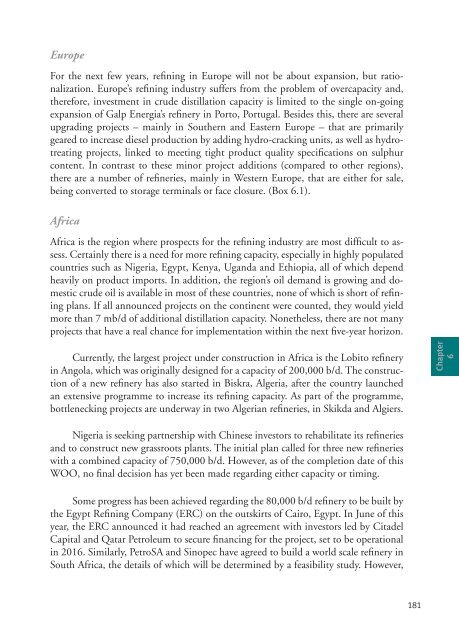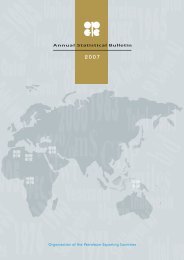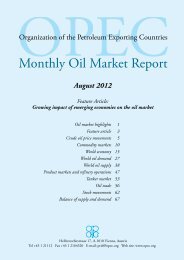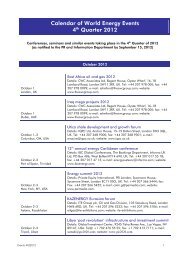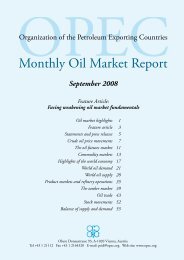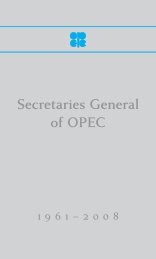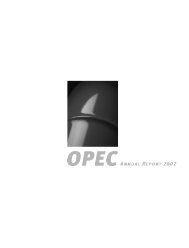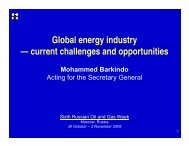World Oil Outlook - Opec
World Oil Outlook - Opec
World Oil Outlook - Opec
- TAGS
- world
- outlook
- opec
- www.opec.org
You also want an ePaper? Increase the reach of your titles
YUMPU automatically turns print PDFs into web optimized ePapers that Google loves.
Europe<br />
For the next few years, refining in Europe will not be about expansion, but rationalization.<br />
Europe’s refining industry suffers from the problem of overcapacity and,<br />
therefore, investment in crude distillation capacity is limited to the single on-going<br />
expansion of Galp Energia’s refinery in Porto, Portugal. Besides this, there are several<br />
upgrading projects – mainly in Southern and Eastern Europe – that are primarily<br />
geared to increase diesel production by adding hydro-cracking units, as well as hydrotreating<br />
projects, linked to meeting tight product quality specifications on sulphur<br />
content. In contrast to these minor project additions (compared to other regions),<br />
there are a number of refineries, mainly in Western Europe, that are either for sale,<br />
being converted to storage terminals or face closure. (Box 6.1).<br />
Africa<br />
Africa is the region where prospects for the refining industry are most difficult to assess.<br />
Certainly there is a need for more refining capacity, especially in highly populated<br />
countries such as Nigeria, Egypt, Kenya, Uganda and Ethiopia, all of which depend<br />
heavily on product imports. In addition, the region’s oil demand is growing and domestic<br />
crude oil is available in most of these countries, none of which is short of refining<br />
plans. If all announced projects on the continent were counted, they would yield<br />
more than 7 mb/d of additional distillation capacity. Nonetheless, there are not many<br />
projects that have a real chance for implementation within the next five-year horizon.<br />
Currently, the largest project under construction in Africa is the Lobito refinery<br />
in Angola, which was originally designed for a capacity of 200,000 b/d. The construction<br />
of a new refinery has also started in Biskra, Algeria, after the country launched<br />
an extensive programme to increase its refining capacity. As part of the programme,<br />
bottlenecking projects are underway in two Algerian refineries, in Skikda and Algiers.<br />
Nigeria is seeking partnership with Chinese investors to rehabilitate its refineries<br />
and to construct new grassroots plants. The initial plan called for three new refineries<br />
with a combined capacity of 750,000 b/d. However, as of the completion date of this<br />
WOO, no final decision has yet been made regarding either capacity or timing.<br />
Some progress has been achieved regarding the 80,000 b/d refinery to be built by<br />
the Egypt Refining Company (ERC) on the outskirts of Cairo, Egypt. In June of this<br />
year, the ERC announced it had reached an agreement with investors led by Citadel<br />
Capital and Qatar Petroleum to secure financing for the project, set to be operational<br />
in 2016. Similarly, PetroSA and Sinopec have agreed to build a world scale refinery in<br />
South Africa, the details of which will be determined by a feasibility study. However,<br />
181<br />
Chapter<br />
6


